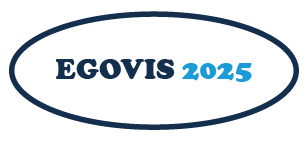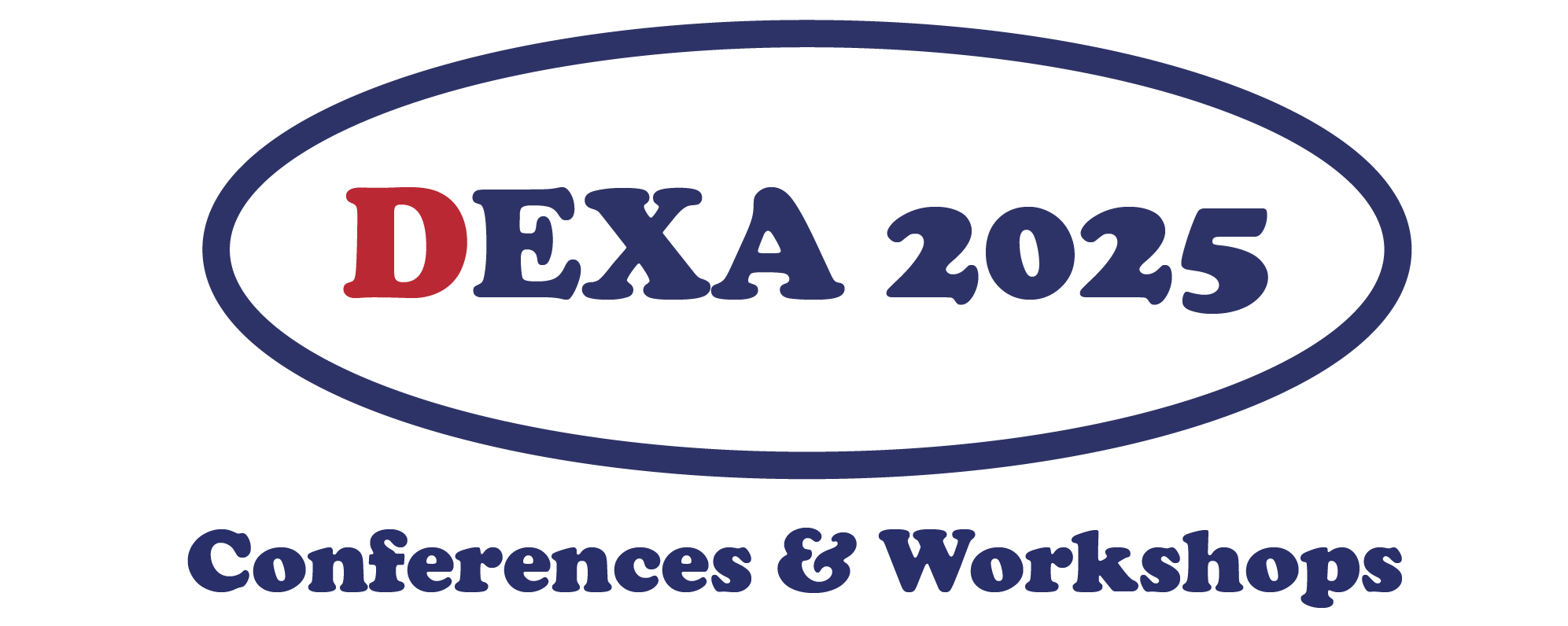Welcome to EGOVIS 2025

The 14th International Conference on Electronic Government and the Information Systems Perspective
August 25 - 27, 2025
Bangkok, Thailand
"Digitalisation, Innovation, Automation and Transformation"
Papers submission: https://egovis2025.iiwas.org
Important Dates
Paper submission: 10 April 2025 (Sharp & Final)
Notification of acceptance: 20 May 2025 (sent)
Camera-ready copies due: 15 June 2025
Authors Registration deadline: 15 June 2025
Conference days: 25-27 August 2025
News
- DEXA 2025 conferences and workshops will be held in Bangkok, Thailand from 25 - 27 August 2025
- DEXA 2025 and associated conferences and workshops will be held in person and will not provide a hybrid setting. All accepted papers must be presented at the conference by one of the authors. Failure to comply with this requirement will result in the exclusion of the paper from SpringerLink, and the paper will not be eligible for the Best Paper Award.
- Acceptance Notifications have been sent out to contact authors. Please check with your co-authors and if no one received it, please write to us (dexa@iiwas.org)
- Please refer to the camera ready submission page for uploading the camera ready of your paper before 15 June 2025 (SHARP).
- Please complete your registration and payment at the registration page before 15 June 2025 (SHARP).
- Information about conference venue, transportation, accommodation can be found here.
Publication
All accepted EGOVIS2025 papers will be published by Springer in their Lecture Notes in Computer Science (LNCS). LNCS volumes are indexed in Scopus; EI Engineering Index; Google Scholar; DBLP; etc. and submitted for indexing in the Conference Proceedings Citation Index (CPCI), part of Clarivate Analytics’ Web of Science.
Scope
The EGOVIS conference series focuses on the transformative potential of digitalization, digital transformation, and innovation in electronic government. It highlights the pivotal role of advanced technologies like artificial intelligence (AI), machine learning, and data science in reshaping public administration, governance, and citizen engagement. These technologies drive smarter government processes, enable data-driven decision-making, and support inclusive and sustainable e-government solutions, emphasizing dimensions like e-administration, e-democracy, e-participation, and e-voting.
Automation and innovation in e-government are central themes, encompassing the use of technologies such as cloud computing, fog/edge computing, and recommender systems to improve efficiency and responsiveness. From online tax payment systems to cross-border digital services enabled by frameworks like eIDAS, these advancements streamline government processes, reduce manual effort, and enhance citizen-centric services while addressing challenges related to privacy, trust, and security.
EGOVIS provides a platform for interdisciplinary dialogue, bringing together researchers, practitioners, and policymakers to explore topics like digital literacy, bridging the digital divide, and promoting open innovation. The conference also delves into critical areas such as legal and regulatory aspects, open-source solutions, interoperability, and the role of enterprise architectures in creating scalable and adaptive e-government systems.
The conference invites original research and innovative contributions that address current challenges and opportunities in e-government. By fostering collaboration across academia, industry, and public administration, EGOVIS aims to advance smart governance, support regional and cross-border initiatives, and drive the digital transformation necessary for inclusive, transparent, and efficient electronic government.
Topics of Interest
Topics of interest include (but are not limited to) the following:
- Artificial intelligence (AI), machine/deep learning and generative AI for e-government
- Data science and business analytics in government: big data, open data and database aspects
- Digital transformation
- Smart government, smart governance and smart cities
- Cloud computing and Fog/edge computing for e-government
- Enterprise architectures and information systems architecture for e-government
- Economics of e-government
- E-democracy/e-participation
- Digital/AI literacy, education and training
- Bridging the digital divide and promoting inclusive e-government
- Sustainability in e-government context
- Electronic identity, identity management
- E-government policies and strategies
- Legal and regulatory aspects, legal informatics
- Open Government
- Open innovation, innovation management, transparency, transformation and change management
- Open-source solutions for e-government, ubiquitous and pervasive computing
- Personalization and recommender systems
- Privacy, trust, and security approaches in e-government
- ICT approaches for homeland security
- Interoperability in e-government
- Regional collaboration and cross-border initiatives (e.g. central European research and cross-border piloting)
- Impact of eIDAS on cross-border digital services
Submission Guidelines
EGOVIS 2025 follows a single-blind review policy. Authors are invited to submit electronically original contributions or experience reports in English. The submitted manuscript should closely reflect the final paper as it will appear in the proceedings. EGOVIS will accept submissions of both short and full papers.
- Short papers: up to 6 pages on preliminary work, vision papers or industrial applications
- Full paper: up to 15 pages (including references and appendixes) and papers are expected to be more mature, contain more theory or present a survey (tutorial style) of some interesting topic.
Any submission that significantly exceeds length limits or deviates from formatting requirements may be rejected without review.
Submission Procedure
Papers submission will be managed using HotCRP papers submission system
Authors should consult Springer’s authors’ instructions and use the proceedings templates, either for LaTeX or for Word, for the preparation of their papers.
Please refer to Paper Submission page.
Review Process
Submitted papers will be carefully evaluated based on originality, significance, technical soundness, and clarity of exposition. Duplicate submissions are not allowed and will be rejected immediately without further review. Authors are expected to agree to the following terms: "I understand that the submission must not overlap substantially with any other paper that I am a co-author of or that is currently submitted elsewhere. Furthermore, previously published papers with any overlap are cited prominently in this submission"Questions about this policy or how it applies to a specific paper should be directed to the PC chair.
Program Committee Chairs
Program Committee
- Alejandra Cechich, Universidad del Comahue, Argentina
- Aljosa Pasic, Eviden, Spain
- Amira Mouakher, University of Perpignan. France
- Bálint Molnár, Eötvös Loránd University, Budapest, Hungary
- Chien-Chih Yu, National ChengChi University, Taiwan
- Christos Kalloniatis, University of the Aegean, Greece
- Costas Vassilakis, University of the Peloponnese, Greece
- Csaba Krasznay, Ludovika University of Public Service, Budapest, Hungary
- Enrico Francesconi, IGSG-CNR, Italy
- Erich Schweighofer, University of Vienna, Austria
- Fernando Galindo, University of Zaragoza, Spain
- Francisco Javier García Marco, Universidad de Zaragoza, Spain
- György Drótos, Corvinus, University of Budapest, Hungary
- Herbert Leitold, A-SIT, Austria
- Javier Nogueras Iso, Universidad de Zaragoza, Spain
- Jean Vincent Fonou-Dombeu, University of KwaZulu-Natal, South Africa
- Luis Alvarez Sabucedo, Department of Telematics, Universidade de Vigo, Spain
- Noppon Choosri, Chiang Mai University, Thailand
- Rozha Ahmed, Sulaimani Polytechnic University, Iraq
- Sara Lazzaro, Università della Calabria, Italy
- Vytautas Čyras, Vilnius University. Italy
- Wichian Chutimaskul, King Mongkut's University of Technology Thonburi, Thailand
For further inquiries, please contact (egovis2025@iiwas.org)


